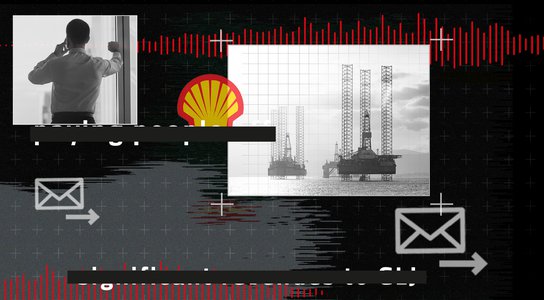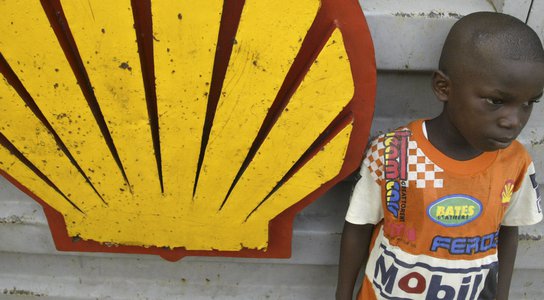A deal struck by Shell and Eni for one of Africa’s most promising oil blocks reduced Nigeria’s expected revenue by an estimated $6bn, new analysis from world-class oil experts reveals today. The projected lost revenue could fund Nigeria’s combined annual federal health and education budgets twice over.
The oil giants' 2011 deal for Nigeria’s OPL 245 oil licence hid terms that deprive the Nigerian state of billions of dollars of future revenue, whilst bringing the companies huge additional profits (1). The revelations are published in a report from Global Witness called Take the Future. It draws on an analysis from leading experts at Resources for Development Consulting commissioned by Global Witness and NGOs HEDA, RE:Common and The Corner House.
The analysis of the contract terms estimated these changes could reduce the Nigerian Government projected revenue from the oil fields by $5.86bn over the lifetime of the project when compared to the terms that had applied before the 2011 deal, and assuming an oil price of $70 per barrel.
Shell and Eni are already facing bribery charges over the OPL 245 deal in a landmark trial in Milan (2). Today’s report shows the companies altered the terms of the agreement in their favour.
Two weeks before the deal was signed in 2011, Nigeria’s most senior civil servant in the Department of Petroleum Resources wrote to the President calling the deal “highly prejudicial to the interests of the Federal Government” (3).
Barnaby Pace from Global Witness said “Shell and Eni execs set the deal up so that Nigeria would earn some $6bn less than it could have. This scandalous deal must be cancelled.”
Nigeria, one of the most oil rich countries on the planet, has the world’s highest number of people living in extreme poverty in the world, at 87 million. 80% of Nigerians live on less than two dollars a day.
No company as large as Royal Dutch Shell or such senior executives of a major oil company have ever stood trial for bribery offences. The trial continues and Eni and Shell, together with their managers and other defendants have denied wrongdoing.
Shell did not comment on the specific points put to them, saying that “issues that are under consideration as part of a trial process should be adjudicated in court” but stated “we maintain there is no basis on which to convict Shell or any of its former employees. We believe that the trial judges will conclude that there is no case for us to answer and we are vigorously defending our position accordingly”. They also disputed the methodology and alleged that wrongful factual assumptions were made, but did not specify any particular error.
Eni rejected “any allegation of impropriety or irregularity”. They said in light of their ongoing trial it would be “inappropriate for us to comment on such circumstances outside the court” but did not comment on the specific points put to them about the study other than to say “the technical and contractual assumptions adopted as the basis for the analysis appear to be partial and inaccurate, if not misleading.”/ ENDS
Contacts
Notes to editor:
1. To establish the effect on Nigeria’s potential revenue from the block, Resources for Development Consulting compared the 2011 deal to the terms that had applied when it was originally given to Malabu in 2006. They estimate these changes reduce the Nigerian Government projected revenue from the oil fields by $5.86bn when compared to terms struck in a previous deal for the block and assuming an oil price of $70 per barrel. The International Monetary Fund recommends that mature oil producing countries should receive 65% to 85% of oil revenues with the rest allowed to go to oil companies. The current OPL 245 deal is projected to result in Nigeria receiving a historically poor share of just 41%.
2. Previous reporting has shown that the oil giants knew that $1.1 billion they paid for the block in 2011 would go to private individuals, including convicted money launderer Dan Etete. Etete had awarded OPL 245 to a company he secretly owned whilst serving as Nigerian oil Minister in 1998.
3. Other senior civil servants objected. These concerns appear to have been ignored or overruled by Nigerian Government ministers, individuals who are now accused of receiving bribes from Shell and Eni’s $1.1bn payment for the licence.
4. A press conference will be held at Regent Hotels, Lagos at 9am local time on 26th November 2018.
5. Nigerian authorities have also filed charges against a Shell subsidiary and Eni as well as several of their staff. A trial is pending against the companies and Mohammed Adoke, the former Nigerian Minister of Justice and Attorney General who has been charged with money laundering over his receipt of $2.2m in alleged proceeds of the OPL 245 deal. Nigerian authorities have said they intend to extradite Mr Adoke. Mr Adoke has denied the charges and claims the money came from a legitimate property deal. Mohammed Adoke responded through his lawyer emphasising that the President and other Nigerian agencies had agreed the 2011 deal and claimed that “he is not facing bribery allegations by the EFCC in Nigeria or in any other jurisdiction including the Italian proceedings as erroneously stated in your correspondence. For avoidance of doubt, our client was charged by the EFCC with other defendants for aiding the commission of money laundering offences. The Proof of Evidence presented by the EFCC in support of their charges did not disclose any allegation of bribery against our client but that he authorized payment of over $800 million to Malabu Oil and Gas Limited.” He additionally cited a 2018 Judgement of the Nigerian High Court that ruled that he could not be “held personally liable for discharging the functions of his office by carrying out such lawful directives of the President”. He responded to the analysis’s findings stressing that the deal was concluded following consultations with relevant ministries, no attempt was made to prevent civil servants voicing their concerns, and issues were resolved following inter-ministerial discussions. He also noted that the current oil minister has reportedly written that the deal was a viable route to resolving disputes over the license. His full response can be seen on the Global Witness website.
6. The Nigerian government has recovered around $70m in proceeds of the deal from the UK. The money had previously been frozen as suspected proceeds of crime at the request of Italian authorities. The Nigerian government has also issued an $875m civil claim against JP Morgan for their role as a banker to the deal. JP Morgan has stated that they consider the allegation against them to be “unsubstantiated and without merit”.
7. Goodluck Jonathan’s previous statement addressing the allegations against him over the deal is available at http://www.premiumtimesng.com/news/headlines/220059-breaking-malabu-oil-deal-jonathan-breaks-silence-bribe-allegation.html
8. Dan Etete’s previous response to the public allegations relating to the deal is available at: https://www.thisdaylive.com/index.php/2017/02/08/etete-government-did-not-invest-a-dime-in-malabu-oil/
9. Diezani Alison Madueke’s previous statement in response to public allegations around the deal is available at http://dailypost.ng/2017/08/15/90-billion-loot-diezani-finally-breaks-silence/
You might also like
-
Campaign Hub OPL 245: Shell and Eni's Nigeria Deal
Since 2011, we have investigated and exposed oil giants Shell and Eni's role in the scandalous ‘Malabu’ deal for a Nigerian oil block: OPL 245.
-
Report Take The Future: Shell's scandalous deal for Nigeria’s Oil
New analysis shows oil giants Shell and Eni set up a deal to deprive Nigeria of $6 billion
-
Report Shell Knew
Emails show senior executives at world’s fifth largest company knowingly took part in a vast bribery scheme that robbed the Nigerian people of $1.1billion.